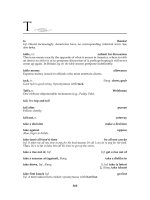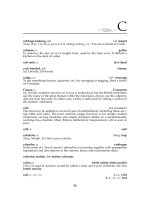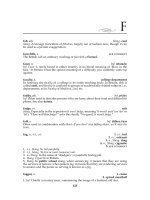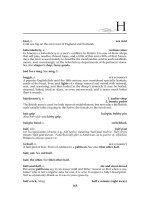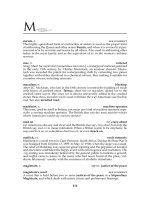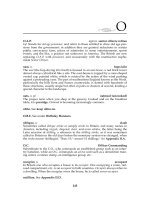british english a to zed phần 1 ppsx
Bạn đang xem bản rút gọn của tài liệu. Xem và tải ngay bản đầy đủ của tài liệu tại đây (731.07 KB, 42 trang )
A
rigorously
researched,
wickedly
witty,
and eminently useful
collection
of
nearly
5,000
Briticisms (and Americanisms)
BRITISH
ENGLISH
A
TO ZED
Revised
and
Updated
Edition
(the )
Queen
I.
Inf.
To stay at a
dance
through
the
QÏWH
to stav to
the
very
end. It
lsiisuaj
to
plav
Cod Save the Que
tocW
thi
N
O
RM
AN.
WACja
U
IT
sir
2.
//;/'
The
toast
to the
Queen,
known
as the Loyal Toast.
Il
t
%
o
o
n
\A
1i
m
*N
r>
»•>
m
il
m
m\r
BRITISH
ENGLISH
ATO
ZED
u
PRAISE
FORTHE PREVIOUS EDITION:
.
the outstanding
authority
on the
similarities
and differences
between
British
and
American
English.
*
—Laurence
Urdang, Verbatim, The Language Quarterly
''it's
a clinking (damned good) book to
have
about.
—Kirkus
Reviews
B,
'ritish
English
A
to
Zed
is
the most comprehensive guide to everyday
English
as
it is spoken on
both
sides of the Atlantic. No longer will you be left
confused
when
someone asks to borrow your
biro
(ballpoint pen) or your
housewife
(sewing kit).
This updated and revised edition includes more than 5,000 words from sources as
diverse
as
London
businesses
and
Bridget
Jones's
Diary,
as
well as
lively,
up-to-date
dis-
cussions
of
British
pronunciation, punctuation, and style; units of
measure;
automo-
tive terms; cricket terms; and much more. Arranged alphabetically by Briticism,
entries feature their corresponding Americanisms as well as details about
usage.
For
readers, travelers, and Anglophiles everywhere, this entertaining and
authoritative resource is a cultural delight.
ENTRIES
INCLUDE:
British
aerodrome
court shoes
high
tea
ruby wedding
On your bike!
feeder
yonks
American
airfield
pumps
light
supper
40th wedding anniversary
Get lost!
child's
bib
ages
Eugene
Ehrlich
is coeditor of the Oxford
American
Dictionary and author of
numerous books on
language,
including
You've
Got
Ketchup
on
Your
Muumuu:
An
A-to-Z
Guide
to
English
Words
from
Around
the
World;
The
Highly
Selective
Dictionary
for
the
Extraordinarily
Literate,
and
Veni,
Vidi,
Vici:
Conquer
Your
Enemies,
Impress
Your
Friends
with
Everyday
Latin. A former senior lecturer of
English
at Columbia
University, he lives in Mamaroneck, New York.
The late
Norman
W.
Schur
wrote
several books on
language
and divided his
time
between England and the United States.
ISBN
D-fllbQ-ME3fl-l
On the
cover:
Detail of
Queen
Elizabeth
I (Anonymous,
16th century,
English
School,
Calleria
Palatina,
Palazzo
Pitti, Florence) courtesy
Scala/Art
Resource, N.Y.
Cover
design
by Cathy Rincon
Printed in the United States
of
America
9
780816"042388'
90000
BRITISH
ENGLISH
A
TO
ZED
ENGLISH
A
TO
ZED
Revised
and
Updated Edition
NORMAN
W. SCHUR
REVISED
BY
EUGENE EHRLICH
Facts On File, Inc.
BRITISH
ENGLISH A TO ZED
Revised
and
updated
edition.
Copyright © 2001 by Eugene Ehrlich and the estate of Norman W. Schur.
Previous edition copyright © 1987 by Norman W. Schur.
All rights reserved. No
part
of this book may be reproduced or utilized in any
form or by any means, electronic or mechanical, including photocopying,
recording, or by any information storage or retrieval systems,
without
permission in writing from the publisher. For information contact:
Checkmark Books
An
imprint
of Facts On File, Inc.
11
Perm
Plaza
New York NY 10001
Library
of Congress
Cataloging-in-Publication
Data
Schur, Norman W.
British
English A to Zed / Norman W. Schur
with
Eugene
Ehrlich.—Rev.
and
updated
ed.
p. cm.
Includes index.
ISBN
0-8160-4238-1
(hardcover :
alk.
paper) —
ISBN
0-8160-4239-X
(pbk. :
alk.
paper)
1.
English
language—Great
Britain—Dictionaries.
2.
Great
Britain—
Civilization—Dictionaries.
I. Ehrlich, Eugene H. II. Title.
PE1704
.S38
2001
423'.
1—dc21
00-060059
Checkmark Books are available at special discounts
when
purchased in bulk
quantities for businesses, associations, institutions, or
sales
promotions. Please
call
our Special
Sales
Department
in New York at 212/967-8800 or
800/322-8755.
You can find Facts On File on the
World
Wide
Web at
Cover design by Cathy Rincon
Printed in the United States of America
MP Hermitage 10
987654321
(pbk) 10
987654321
This book is
printed
on acid-free paper.
For
Marjorie
Schur—incurable
Anglophile
CONTENTS
Foreword
Acknowledgments
Preface
Explanatory
Notes
Introduction
British
English:
A to Zed
Appendix
I—General
Differences Between
British
and
American
English
A.
Syntax
1.
Prepositions
2.
Definite articles
3.
Compound
nouns
4.
Noun-verb agreement; collectives
5.
Who and
other
pronouns
B.
Pronunciation
1.
Proper nouns and adjectives; general; county name abbreviations
(Tables)
2.
Common nouns (Tables)
C. Spoken Usage and
Figures
of Speech
1.
General
2.
Do and done
3.
Directness and subtlety of British and American styles compared
4.
Usage of selected units of measure
5.
Usage of selected monetary units
6. U and non-U
D.
Punctuation
and
Style
1.
Hyphens
2.
Parentheses
3.
Quotation
marks
4.
Time of day
5.
Dates
6. Abbreviations of forms of address
7.
Forms of address
8. Placement
of
River
9. Miscellaneous abbreviations
E.
Spelling
viii British
English
A to Zed
Appendix
II—Glossaries
and Tables
A. Currency
B.
Financial
Terms
C. Units of Measure
1.
Dry measure
a. barrel
b. hundredweight
c. keel
d. quart
e.
score
i. pigs,
oxen
ii.
coal
f. stone
(Table
of weights of various commodities)
g. ton
h.
zvindle
2.
Liquid measure
a. gallon
b. gill
c. pint (see gallon)
d. quart (see gallon)
D. Numbers (Table)
E.
Automotive Terms (Table for
parts
of: Body,
Brakes,
Chassis,
Electrical
Equipment,
Motor and Clutch, Axle and Transmission, Steering, Tools
and
Accessories,
Transmission,
Tires)
F.
Musical Notation (Table)
G. Slang
1.
Cant
2.
London slang (Table)
3.
Rhyming slang (Table)
4.
Poker slang (Table)
5.
British
betting
terms
(Glossary)
H. Food Names
I.
Botanical and Zoological Names
J.
Britain, Briton, British, English, etc.
K.
Cricket Terms (Glossary)
L.
Connotative
Place-Names
Index
FOREWORD
Norman W. Schur, known for his work as an attorney and interpreter of
British
English,
departed this earth a few
years
ago,
leaving
the rest of us bereft.
Well before his death, he communicated with me through Dorothy
Pace,
a
mutual friend and one-time collaborator on one of my
early
books,
asking
whether I would work on a book with him. I never did find out the title of the
book he had in mind, but I do know
that
his request came at an inopportune time
for
me and I had to refuse.
At any rate, I was quite familiar with his lexicographic work, particularly the
first
edition of the book you are now reading, and I felt honored when
Schur's
publisher, Facts On
File,
came to me much later to ask my help in preparing a sec-
ond edition of
Schur's
work.
With
all humility, I dedicate this work to Marjorie Schur, formerly of Connecti-
cut. Further, I acknowledge the willing help of Tamara
Glenny
one of my
English
daughters-in-law,
in sorting through some of the new entries for the work.
Eugene
Ehrlich
Mamaroneck,
New York
This lexicon first appeared in the form of British
Self-Taught:
With
Comments in
American,
published by
Macmillan
Publishing Company, Inc., New York, in 1973.
Johnston & Bacon Publishers, of London and Edinburgh, a subsidiary of Cassell
&
Collier-Macmillan
Publishers of London, brought out a somewhat revised edi-
tion under the same title the following year. Under the new title English
English,
it
made its bow under the
aegis
of Verbatim,
Essex,
Connecticut in 1980. This incar-
nation,
with
the inestimable help of Kate Kelly, became British
English,
A to Zed.
For
the first edition, help far beyond the reasonable bounds of hospitality came
to me from many kind and patient
English
friends.
Besides
much painstaking
correspondence over the
years,
there were many long
sessions
in
English
homes,
gardens
and pubs: countless words,
gallons
of tea, barrels of beer. I was indebted
to my great friends John and Sarah (now Sir John and
Lady)
Freeland, Ronald
Smith, Alan Vaughan, Donald Walker and Peter Tanter, and my now dear
departed C. E. Thompson, B. T. Flanagan, Kenneth Fearon, Charles Kirby and
Philip
Harding; not a
single
philologist in the lot, of immensely varied back-
ground,
with
nothing whatever in common except kindness, intelligence, wit and
taste. On the American side, I owed much to Edmée Busch, who helped put the
manuscript into intelligible shape, and my secretary, Dorothy Schnur, stubbornly
loyal
through moments of self-doubt.
For
the second edition, my oldest friend, Ralph Berton, was of invaluable aid in
supplying
new entries and suggestions for improvement. Robert Elwell
kept
sending
a flow of new items
that
I gleefully adopted. Dr Edwin M. Hudson plied
me
with
new entries and recondite discussion. Warren Knock, of Johnston &
Bacon
Publishers, was patient and creative during
that
episode. After the appear-
ance
of the London edition, I received a long and learned letter from Paul S.
Falla,
a
New Zealander
with
a distinguished background in the United Kingdom diplo-
matic service, now living in England. His help has been enormous. Ronald Mans-
bridge,
formerly head of the New York office of the Cambridge University
Press,
has
never faltered in his interest and help. I have
also
been fortunate in receiving
creative editorial guidance from the noted lexicographer Laurence Urdang.
XI
The book is essentially a
glossary
of Briticisms for the guidance of Americans
caught in the entrapment of a common
language.
I have seen fit to include certain
terms and expressions which, though they may be fading from current British
use,
or may even have disappeared completely from most people's everyday
conversation, an American might run up against in the literature of a few years
ago,
or quite possibly in the conversation of an elderly person, especially in the
more remote parts of the British countryside. In some instances, I have expanded
the discussion in an effort to demonstrate not only peculiarities of the language
of
Britain, but
also
aspects of her culture as reflected by her
language.
What
began as a pastime took on tangible form and, somewhat to my own sur-
prise,
has emerged as a serious compilation. I would be grateful if (in addition to
omissions
and possible erroneous inclusions and definitions) new items which
appear from time to time were called to the attention of the publisher. Not the
least
of my rewards has been the volume and tenor of the response I have
received from scholars and aficionados in many parts of the world who have
written
letters ranging from a few words of appreciation to
essays
full of valuable
information and comments. Many of the entries must evoke some controversy
and even censure. "A dictionary-maker," said H. W. Fowler in his preface to the
Concise
Oxford
Dictionary
(reprinted in the sixth edition of
that
admirable work,
1976),
"unless he is a monster of omniscience, must deal
with
a great many mat-
ters of which he has no first-hand knowledge.
That
he has been guilty of errors
and omissions in some of these he will learn soon after publication, sometimes
with
gratitude to his enlightener, sometimes otherwise."
—Norman
Schur
For
a full discussion of the criteria used in assembling the Briticisms and their
American equivalents the reader is referred to the Introduction. The following
are
brief notes on how to use the dictionary.
Entries
Briticisms,
listed alphabetically, are set in boldface on the left-hand side of each
entry. American equivalents are set in boldface on the right, opposite the British
headword.
When
there
is no American equivalent,
SEE
COMMENT
refers the reader
to the comment under the headword.
Labels
Parts
of speech are set in italics, immediately following the British headword.
Usage
labels: when a Briticism is nonstandard this is indicated in italics, either at
the beginning of the comment, or, when
there
is no comment, immediately fol-
lowing
the function label. The labels used are:
'Slang,
Inf. (Informal), Old-fash.
(Old-fashioned),
and
Rare.
American equivalents are similarly labeled. Though it
has
been the policy to
attempt
to provide American equivalents of the same
usage
level,
that
has not always been possible, and in such
cases
a comment
always
follows the headword.
When
the American equivalent is only an approx-
imation of its British counterpart, it is preceded by
approx.
Pronunciation
When
the pronunciation of a Briticism is idiosyncratic, i.e., not ascribable to gen-
eral
differences between British and American pronunciation, a phonetic tran-
scription in small capital letters is given at the beginning of the comment,
following
the usage label. The system of notation used is too simple to merit a
table of its own.
Sense
Distinctions
Arabic numerals separate the senses of a headword,
both
in the American equiv-
alent and in the comment. Divisions are based on usage rather than strict seman-
tic distinctions.
Comment
Examples of typical usage are set in italics, as are British and American terms
that
are
used to illustrate meaning. Glosses of Briticisms are set in
single
quotes. Brit-
icisms
used in the comments which appear in the alphabetical listing are set in
boldface
when it is felt
that
referring to
them
would add to the understanding of
the comment.
Cross-References
See,
See
also,
and See under refer the reader to other entries and to the Appendices.
Cross-reference is based on various criteria: related meanings (similarity and
contrast),
related subject
matter
(e.g., pub terms, telephone
terminology—in
such
cases
the reader may be referred to the Appendices), morphological similarity (in
xv
xvi British English A to Zed
several
cases
the American equivalent is itself an entry, e.g., vest is the equivalent
of
the British
waistcoat
and is
also
a Briticism of which the American equivalent is
undershirt).
Readers are
also
referred to the Appendices
that
deal
with
general
differences
between
British and American
English,
when they have bearing on
the entry. Words appearing in boldface type in the
text
of a
comment
have their
own entries in proper alphabetic sequence.
Appendices
The Appendices are of two kinds: the first section contains short notes on general
differences
between
British and American
English.
These are far from compre-
hensive,
but the reader is referred to works
that
deal more fully
with
the topics
discussed.
The second section contains tables and
glossaries
of terms whose meaning and
use
are best shown when the terms are grouped together (e.g., currency, mea-
sures)
and lists of specialized
slang
terms of which only a few are included in the
A-Z section.
Index
of American Equivalents
This addition to the new edition of the book should be of special help to users
searching
for British equivalents of particular American words and phrases. The
American equivalents given in the main, A-Z section of the book are listed alpha-
betically
in the Index, together
with
the equivalent Briticisms, which the reader
will
find treated in full in the main section.
Abbreviations
adj. adjective n. noun
adv.
approx.
con].
inf.
inter].
adverb
approximate
conjunction
informal
interjection
Pi-
prep.
v.i.
v.t.
plural
preposition
verb, intransitive
verb, transitive
BRITISH
ENGLISH
A
TO
ZED
According to Marcus Cunliffe, in The
Literature
of the United States, a chauvinistic
delegate
to the Continental Congress moved
that
the new nation drop the use of
the
English
language entirely; William Morris, in Newsbreak (Stackpole, New
York,
1975),
reports
that
the more violently anti-British leaders moved to reject
English
as the national language in favor of Hebrew, until it was pointed out
that
very
few Americans could speak it; and another delegate proposed an amend-
ment
providing
that
the United States retain
English
and make the British learn
Greek!
American claims to the
English
language are far from being left unanswered.
In
April
1974,
Jacques Chastenet of the Académie française, suggesting Latin as
the most suitable official tongue for the European Economic Community,
expressed the concern
that
"English,
or more exactly American, might otherwise
take over." He characterized "American" as "not a very precise idiom." Frederick
Wood's
attempt
at consolation in his preface to Current English
Usage
(Macmillan
&
Co. Ltd., London, 1962) might seem even more offensive: "Certain words and
constructions have been described as Americanisms. This does not necessarily
mean
that
they are bad
English."
In "An
Open
Letter to the Honorable Mrs. Peter
Rodd (Nancy Mitford) On A Very Serious Subject," Evelyn Waugh, discussing the
American influence, writes: " American polite vocabulary is different from
ours.
. . . [It] is pulverized between two stones, refinement and overstatement."
Cyril
Connolly
went
pretty
far in The Sunday Times (London) of December 11,
1966:
". . . the American language is in a state of flux based on the survival of the
unfittest."
Whatever the relationship may be, and however strongly opinions are voiced,
it seems clear
that
in the jet age, what
with
the movies (the
cinema),
TV (the telly),
and radio (the
wireless
still, to many
Britons),
linguistic parochialism is bound to
diminish.
In Words in
Sheep's
Clothing (Hawthorn
Books,
Inc., New York, 1969),
Mario
Pei, after
referring
to the different meanings given to the same word in the
two countries, writes: " In these days of rapid communication and
easy
inter-
change,
such differences are
less
important than you would think." The latest
edition of the
Oxford
Dictionary
includes a fair number of American terms
not found in earlier editions:
teen-age,
paper-back,
T-shirt,
supermarket,
sacred
cow,
sick
joke,
and many others. And in their recorded dialogue, published under the
title A Common Language, British and American English in 1964 by the British
Broadcasting
Corporation and the Voice of America, Professors Randolph Quirk
of
University College, London, and Albert H. Marckwardt, of Princeton Univer-
sity,
agreed, according to the Foreword,
that
" the two varieties of
English
have
never been so different as people have imagined, and the dominant tendency, for
several
decades now, has been clearly
that
of convergence and even greater simi-
larity."
And in a similarly optimistic mood, Ronald Mansbridge, manager emeri-
tus of the American branch of the Cambridge University
Press,
in his foreword to
Longitude
30 West (a confidential
report
to the Syndics of the Cambridge Univer-
*
The "opposing" parties were on the same side of the controversy.
2
British English A to Zed
sity
Press by Lord Acton), refers to the two countries as "strongly linked
together—let
us reject the old joke
'divided'—by
the English language."
Welcome or not, the process of convergence is slow, and the differences linger.
Herbert
R. Mayes, in his London Letter in the Saturday Review of November 14,
1970,
wrote: ". . . There are enough archaisms here to keep an American off bal-
ance.
The British are stubborn. " And Suzanne Haire (Lady Haire of
White-
abbey, formerly
with
the
BBC,
then
living in New York), writing in The New York
Times of January
11,
1972, of her "Study of
'American-English'
at its source,"
mentioned the "bizarre misunderstandings [which] can result from expressions
which have different meanings on the two sides of the Atlantic." The example she
selected was the informal noun tube, meaning subway in Britain and
television
in
the United States.
When
we get away from standard English and are faced
with
the ephemeral-
ness
of slang and informal terms, the division widens. In a
letter
to The Times
published July
12,
1974, the literary critic and translator Nicholas Bethell,
answering objections to his review of an English translation of The Gulag Archi-
pelago,
wrote: "
What
I was objecting to was the use of words like 'bums' and
'broads'
in a translation. They are too American. 'Yobbos' and
'birds'
would be
equally
inappropriate. They are too British. It is a problem
that
translators are
often faced
with,
how to render slang
without
adding confusing overtones. One
has
to try to find a middle way." To a Briton, a bum is a
behind,
and a
broad
a river-
widening.
To an American, yobbo (an extension of yob,
backslang—reverse
spelling—for
boy, meaning lout or bum) would be unintelligible, as would bird, in
its slang sense, a
'character,'
in the sense of an
eccentric,
as in He's a
queer
bird!
Whether
standard, informal, or
slang,
and despite the "convergence" theory,
the differences are still many and confusing. Bearing a London dateline, Russell
Baker's
column in The New York Times of September
15,1970,
began: "One of the
hardest languages for an American to learn is English," and the language he was
referring to was British English.
About
a year later, Henry Stanhope's review of
Welcome
to Britain (Whitehall
Press,
London,
1971)
in the September
3,1971
[Lon-
don] Times referred to a
glossary
in the book as going " some way towards
bridging
the linguistic gulf, broader than the Atlantic Ocean, which still separates
our cultures." And on an arrival a few years ago at Heathrow
Airport,
London, I
picked up a copy of
Welcome,
a newspaper available
without
charge to passen-
gers,
and read
Sylvia
Goldberg's article headed "Perils of the Spoken
Word"
which began: "One thing American visitors to Britain are seldom warned about is
the
'language
problem,'"
and continued
with
the observation
that
the " most
mundane negotiation, the simplest
attempt
at communication
with
the natives
can
lead to
unutterable
confusion."
Whatever the
future
may hold in store, I have
found
that
many facets of British
English
are still in need of clarification and interpretation. For despite occasional
deletions because the American equivalent has all but taken over, my list of Briti-
cisms
has expanded substantially. Briticisms fall into
three
main categories:
1.
Those
that
are used in
both
countries to mean different things. Thus, daven-
port
means 'small writing desk' in Britain and 'large sofa' in America. Some
words and phrases in this category have diametrically opposite meanings in
the two countries. Bomb in Britain is slang for 'dazzling success'; in America
it generally means 'dismal flop.' The verb
table
has already been mentioned
as
an example of the same phenomenon.
2.
Those
that
are not used at all in America, or extremely rarely, like call box
and kiosk for 'telephone
booth';
hoarding
for 'billboard'; dustman for 'garbage
man.'
Introduction
3
3.
Those
that
are not used (or
if
used
at
all, used differently) in America for
the
simple reason
that
their referent does
not
exist there. Examples abound:
beefeater;
commoner;
during
hours;
Oxbridge. Often these refer
to
social
and
cultural institutions
and
have taken
on
connotative meanings which may
have approximate American counterparts:
Chelsea;
Bloomsbury;
redbrick.
Some
terms qualify
as
Briticisms
not
because they are exclusively British
but
because they have
a
peculiarly British flavor.
I
lump such terms under the general
heading
"preferences." For example,
if a
British
girl
and
an
American
girl
were
out shopping together, the British
girl,
pointing
to a
shop window, might say, "I'd
like
to go
into
that
shop
and
look
at
that
frock," while
her
friend would more
likely
say, "I'd like
to
go into
that
store and look
at
that
dress." The British
girl
might have said
dress
but
would
not
have said
store.
The American
girl
might
have said
shop
but
would never have said
frock.
And
the
person who waited
on
them
would
be a
saleswoman
or
salesman
to
the American
girl,
but a
shop
assistant
to her British friend.
It
is all rather delicate and subtle, and these preferences keep
shifting.
Here is
a
sample list of mutually intelligible terms which qualify as
pref-
BRITAIN AMERICA
blunt (e.g.,
of a
pencil) dull
crash
(automobile, train)
collision
engaged
(busy) tied up
fancy (verb) 1. like 2.
suppose
motor-car
automobile
position
(the way things stand) situation
queer
(peculiar) funny
sea
1.
ocean
2.
beach
snag
(describing
a
troublesome situation)
trouble,
problem,
catch,
hitch
tablet
pill
tidy
clean,
orderly,
neat
trade
business
wager
bet
wretched
(e.g.,
of
weather, person, luck) awful,
terrible
In
addition
to
matters
of
preference, there
is a
category
that
may
best
be
described by the
term
overlaps,
to
describe the situation where the British
also
use
the American equivalent,
but the
Americans
do not (or
usually
do
not)
use the
British
equivalent. The British, for example, say
both
crackers
and nutty (meaning
'crazy'),
but
Americans
do not
use
crackers
in
that
sense. Many American terms
are
by now used more frequently
in
Britain than
the
parallel Briticism which has
become old-fashioned.
I
have preferred
to
include such entries,
but in
such
cases,
have mentioned
the
increasing use
of or
total takeover
by
the American equiva-
lent. See,
for
example,
aisle;
flicks.
Conversely,
Briticisms which may
be
familiar
to
many Americans have been
included where
in
my opinion they have not gained sufficient currency
in
Amer-
ica
to be
considered naturalized.
In
years
to
come,
as
jets become bigger
and
faster
and the
world continues
to
shrink, many such items will undoubtedly
acquire dual citizenship.
In
this area, too, inclusion was
the
rule.
Most Briticisms have precise American equivalents,
in
which case they
are
given
in boldface. Occasionally, however, this has not been possible. This applies
to terms
with
figurative meanings; here we are
on the
slippery ground
of
conno-
tations, implicit references, social
context,
and
cultural implications. Many
of
4 British English A to Zed
these are
slang
and informal expressions
that
are too closely tied to British social
and cultural institutions to have American equivalents, and in such
cases
it has
been our policy not to
attempt
to invent one, but instead, to refer the reader to a
comment providing a definition and illustrations of the uses and connotations of
the British
term.
This policy is
also
followed in the case of encyclopedic entries,
like
the
Commons;
beefeater;
Dame.
(The phrase SEE COMMENT in place of an Ameri-
can
equivalent refers the reader to the
text
immediately below the entry.)
On the other hand, there are a good many Briticisms
that
have close or approx-
imate equivalents in American
English.
These are
cases
where the referents may
be different; but the connotative meanings, based on the social or cultural back-
grounds
of the referents, or the referents themselves, may be similar enough to
render the parallel terms approximate equivalents. Thus, though the
City
and
Wall
Street
have different referents, it is reasonable to assume
that
in most con-
texts
in which a Briton would refer to the
City,
an American would say
Wall
Street.
Many
terms have "shared
senses,"
meanings common to
both
countries. The
noun
note,
for instance, can mean
'musical
note' (do, re, mi),
'written
evidence of
debt'
(promissory note),
'memorandum'
(he made a note of it), 'message' (he
passed
her a note), and so on. In Britain it has an additional sense
that
it does not
possess
in America: a 'piece of paper
money'
(a one-pound note, a banknote). The
American equivalent in
that
sense is bill (a one-dollar bill, a five-dollar
bill).
Cor-
respondingly,
the word bill has a multiplicity of
senses;
the
beak
of a bird, the
draft
of
a proposed law, etc. It would unduly lengthen the discussion to list or refer to
all
snared
meanings. It is therefore to be assumed
that
in the case of terms
with
more than one sense, those not dealt
with
are common to
both
countries.
It has been difficult to apply precise criteria of inclusion and exclusion. Many
slang
and informal terms have been included but others omitted because they
seemed too ephemeral or too narrowly regional. A
roke
is a
ground
fog,
but only in
Norfolk. In certain parts of Surrey they eat
clod
and stickin, an unattractive-
sounding
stew, but if you asked for it outside of
that
area you would be met
with
a
totally uncomprehending stare. It is well to avoid Lancashiremen and York-
shiremen who are razat: they're
sore
at you. In parts of Yorkshire a donkey is a
fussock
or a
fussenock,
in Lancashire a bronkus or a pronkus. Such narrowly
restricted dialectal terms, though amusing enough, have been reluctantly passed
by.
In the Appendix section, however, we have included certain lists of localized
slang.
Pronunciation has been indicated by reference to common words presumably
familiar
to the general reader, rather than through the use of phonetic symbols
which remain an unbroken code to all but specialists. There is an index of Amer-
ican
terms for the benefit of those seeking British equivalents. There are appen-
dices
dealing
with
general aspects of British
English,
and special
glossaries
of
related terms
better
presented in
that
fashion than as separate headwords.
A separate section, "Explanatory Notes," is devoted to instructions for the
most efficient use of the book.
A.A. Automobile Association
Opposite
number
to America's
A.A.A.
(American Automobile Association). Just
about
everybody in Britain who drives a car is a member of the A.A. or of the
R.A.C.,
which is short for Royal Automobile Club.
A.A.A.
SEE
COMMENT
1.
See
A.A.
2.
Amateur Athletic Association.
3.
A film suitability rating, in Britain meaning
'not
for persons under 14/
abandonment,
n. abandon
In the sense of
'uninhibited
conduct/ Abandon is used in Britain as well.
about
a
dv.
around
Used as an adverb indicating place, meaning 'near' or 'in the
vicinity,'
as in, Is
your
father
about?
In the sense of 'approximately' Americans use
both
terms inter-
changeably,
but the British
much
prefer
about.
See also Appendix
I.A.I.
above the salt
SEE
COMMENT
Long
ago, when the family saltcellar among the powerful and wealthy was a mas-
sive
silver container, it was placed in the middle of the dining table and marked
the boundary
between
the
classes
when people dined together. Those seated
above
the salt were members of the higher
classes,
the family and their peers; those
below
the salt were seated among the inferior guests. Today, of course, these terms are
used only metaphorically. At a banquet or formal dinner, however, to sit
above
the
salt is to sit in a position of distinction.
absolutely
sweet delightful
Usually
applied to people, but it can refer to almost anything.
academicals,
n.
pi.
cap and gown
Also
known as "academic costume" and the hat being called informally a "mor-
tarboard," a
term
shared
with
the United States.
Academy,
n.
SEE
COMMENT
Royal Academy of Arts. The Academy is usually so understood;
academician
refers
especially
to
that
institution. The initials R.A. after a name mean
that
the artist is
a
member of the institution.
accept,
v.i. agree
For instance, I cannot
accept
that you have met the conditions of the
contract.
A com-
mon use in Britain. See discussion under
agree.
access,
n. visitation
Term
used in matrimonial law, referring to the rights of the
parent
without
custody
to visit the children of the marriage. See a different usage in except for
access;
and

